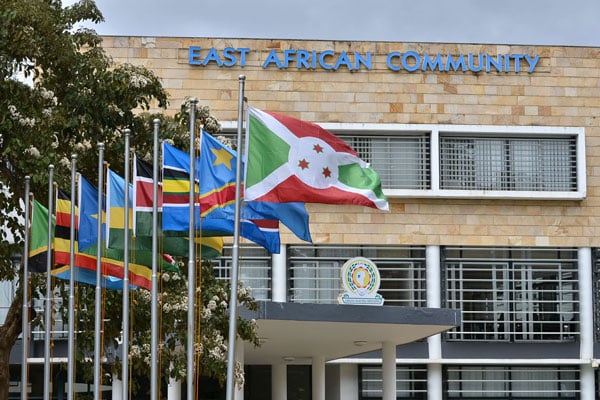
Former Nairobi governor Mike Sonko.
The East African Court of Justice has agreed to hear a dispute filed by former Nairobi Governor Mike Mbuvi Sonko over a legal decision in Kenya to bar him from holding public office.
The move is a partial victory for Mr Sonko who has tried to overturn the political hurdles mounted by a Kenyan court.
The EACJ said it has the jurisdiction to hear and determine aspects of the application that allege contravention of the treaty that formed the East African Community, to which Kenya domesticated as law.
“The applicant has demonstrated that the Supreme Court could have failed to adhere to its own procedural rules, which if proved, would be in violation of Article 25 of the constitution of Kenya and Articles 6 and 7 of the Treaty,” the court presided by Justice Yahane B Masara said.
According to the EACJ, Sonko who was impeached in 2020, demonstrated that he would suffer irreparable harm if the orders sought were not granted.
This is because the Supreme Court decision barred him from participating in politics, which has profound and far-reaching consequences, he argued.
“The impact on his political rights, reputation and capacity to engage in public services underscores the irreparable nature of the harm he faces,” said the regional court.
Sonko was removed as the governor of Nairobi County on November 26, 2020 and he moved to the High Court where he filed several petitions, to challenge his ouster.
The petitions were dismissed and the matter eventually ended up at the Supreme Court.
He filed the case before the EACJ arguing that in the final decision, the Supreme Court effectively barred him from participating in the subsequent elections and holding public office.
He submitted that the proceedings before the Supreme Court were conducted in a manner that violated the rule of law, natural justice and principles of transparency and accountability.
He stated that Chief Justice Martha Koome publicly expressed opinions on his case before the ruling was made, thereby undermining impartiality.
The actions, he said, undermined articles 6(d) and 7(2) of the Treaty for the Establishment of the East African Community.
Mr Sonko argued that the judicial arm of the Kenya government abdicated its mandate and duties as an independent organ by disregarding the purpose of the constitution and the principles of the treaty establishing the EAC.
Read: Game of Thrones: The changing fortunes of Nairobi ex-governor Mike Sonko in courts as cases crumble
He said he was selectively persecuted and his fundamental political rights and freedoms illegally, unlawfully and unjustifiably curtailed over a flawed judicial process.
Attorney-General Dorcas Oduor challenged the jurisdiction of the court, submitting that the East African Court of Justice lacks the jurisdiction to entertain the case as it cannot review or overturn decisions of national courts, specifically the Supreme Court of Kenya.
According to Kenya’s Attorney-General, the jurisdiction of the court is confined to the interpretation and application of the Treaty.
She said the mandate, does not extend to oversight or reversal of partner municipal courts’ judicial decisions.
The AG argued that the court does not possess appellate jurisdiction over national courts, it cannot review the merits of the decision made by Kenya’s Supreme Court, especially decisions that have interpreted Kenya’s constitution.
She said the dispute is primarily domestic in nature and does not involve the interpretation or application of the Treaty.
Mr Sonko on his part maintained that the EACJ is the appropriate forum for determining whether Kenya’s judicial actions align with its obligations under the Treaty. He argued that this is essential to uphold justice and provide him with the avenue for redress that is consistent with the objectives of the EAC.
Impugned decision
In the decision, the court noted that whereas Articles 27(1), 6(d) and 7(2) of the Treaty as well as Article 33(2) of the treaty confer the court the authority to interpret and determine issues arising under the treaty, the court does not possess jurisdiction to conduct appellate merit reviews court decisions of partner States.
“While the court can inquire into whether the impugned decision or conduct violated the Treaty, it cannot engage in a substantive review of the merits or correctness of the decision,” the court said.
The court stated that while one had allegations of violation of the Treaty, which are within the jurisdiction of the court, and on the other, the appeal-like challenge to the decision of the Supreme Court of Kenya, which lies outside the scope of the court’s authority.
The judges added that while the Supreme Court of Kenya and other apex courts of partner states are the ultimate judicial authorities within their respective jurisdictions, the courts remain subject to obligations arising under international treaty law.
“The international commitments undertaken by the partner states under the Treaty, do not conflict with nor are they subordinate to domestic constitutional principles,” said Judges Masara, Dr Charles Nyawello, Richard Muhumuza, Richard Wabwire and Dr Leonard Gacuko.
The court said the treaty does not undermine the constitutional supremacy of the Supreme Court of Kenya but rather complements it by providing a framework for addressing matters of treaty interpretation as agreed upon by the partner states.
“In that regard, Articles 23, 27 and 3392) of the Treaty grant and delineate the court’s mandate to interpret the Treaty and to ensure compliance with its provisions, with Article 33(2) unequivocally asserting the Court’s supremacy over municipal courts in that regard,” added the judges.
The judges allowed Mr Sonko to amend the petition to incorporate materials from the proceedings of the Supreme Court of Kenya.
Former Justice Minister and 2022 Azimio la Umoja Coalition deputy presidential candidate Martha Karua successfully sued Kenya at the EACJ but the decision was challenged before the Supreme Court by the Attorney General.
In a decision in May, the SCOK said its decisions cannot be subjected to review before the EACJ.
The apex court dealt a blow to the Narc-Kenya leader as it stated that decisions rendered by the regional court over judgments that have been finalised by the Supreme Court have no legal consequences.
“We further hold that domestic courts and regional courts, in this case, the EACJ, do not have a vertical relationship, meaning that decisions of the Supreme Court are not subject to appeal at the EACJ. The EACJ also does not have a merit review jurisdiction over decisions of the Supreme Court. We do find,” the bench presided by Chief Justice Koome said. Senior counsel Ahmednasir Abdullahi has equally filed a petition at the EACJ following his indefinite ban by Kenya’s apex court.











